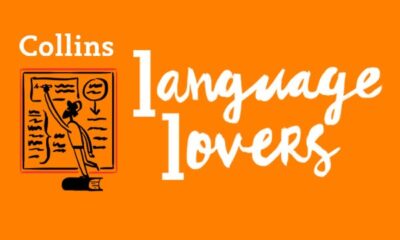Are you thinking of learning a language this year? If so, there’s no one better to advise you than polyglot language learning blogger, Benny Lewis.
The following is taken from the introduction to Fluent in 3 Months, by Benny Lewis, as part of HarperCollins’ 31 Days of Inspiration (#31daysuk). Fluent in 3 Months is available here at 31% discount when you use promo code 31DAYS.
Your story, like mine, begins and ends with passion – the surest path to learning a new language.
In late July 2003, just a couple of weeks after my twenty-first birthday, I moved to Valencia, Spain. To help me adjust to life in a foreign country, I enrolled in a Spanish class. It was a small class, and it was taught entirely in Spanish, which was a bit of a problem for me because I only understood English. I had just graduated with a degree in electronic engineering, and I had barely passed the German and Irish courses I took in high school and college. Languages were definitely not my thing.
After several classes, I was getting absolutely nowhere. Each lesson ended with the other students wearing great big satisfied smiles on their faces. I knew they had figured out something about the language that they didn’t know before, while I still couldn’t understand a single thing. My ego was destroyed. I was, without a doubt, the worst student in the class, and as I walked home with my head hung low, I couldn’t help thinking, it’s not fair! Why were those guys blessed with the language-learning gene and I wasn’t? I’m never going to learn Spanish.
After six months in Spain, I could barely muster up the courage to ask how much something cost or where the bathroom was. I really started to think I would never learn Spanish. I began to worry my experience immersed in a different country would be a total failure. I was convinced my destiny was to spend the rest of my life speaking only English.
Fast-forward seven years. One night in Budapest, I ended up at a ‘couchsurfing’ party at a local bar with an international crowd. I confidently strolled in and said hello to everyone in Hungarian, one of the most notoriously difficult languages in the world. I started chatting with a local, in Hungarian, about my progress with his native language. I had been learning it only for about five weeks, but I was still able to have this rudimentary chat with him.
Next, I noticed a slight Brazilian Portuguese accent from the guy speaking English to my left. I asked, ‘Você é brasileiro?’ (Are you Brazilian?), and when he told me, in Portuguese, that he was from Rio, I immediately switched to my Carioca accent, using slang from his own city, telling him how much I missed it. He was shocked to hear an Irish guy speak his own Portuguese dialect in a random bar in Budapest! Then I recognized a Spanish friend of mine across the table and immediately switched to fluent Spanish, asking her how her Hungarian was coming along. Later, a couple from Quebec arrived, and I turned on my Quebec accent and expressions while speaking French. We exchanged contact information and made plans to hang out the next day. That night I also managed to use some Italian and Esperanto and wowed a Thai tourist with a few phrases of basic Thai, using all the right tones. I even flirted in German with a German girl I saw regularly at these meetings.
In one evening I spoke eight languages (including a little English) casually, socially, and naturally. I switched between them effortlessly, without mixing them up, and – more importantly – made some amazing new friends in the process. Since then I’ve learned several other languages, and at the time of writing this, I can confidently use twelve languages in varying degrees of proficiency, from conversational Dutch, Mandarin, Chinese, and American Sign Language to certified mastery in Spanish and everything in between for the other nine. I understand the basics of another twelve languages on top of these.
I also run Fluentin3months.com, the world’s largest language-learning blog, which, to date, has helped millions of people around the world learn a new language. All of this is true despite the fact that I spoke only English until the age of twenty-one and did poorly in my attempts to learn languages in school. How did this happen? How did I go from dropping out of my Spanish language class to being able to converse in more than a dozen languages? Simply by changing how I approach new languages.
The Way to Learn a Language Is to Live It
One of the biggest issues with a traditional approach to language-learning is that the benefits of picking up a new language are constantly postponed. Study this and study that and then, if you’re lucky, in a few years’ time, you’ll eventually understand the language. As well as being far from the truth, this approach removes the fun and the life from the process. In many education systems, especially in English- speaking countries, languages are taught the same way as any other subject, like geography or history. Teachers provide the ‘facts’ (vocabulary) so the student will ‘know’ the language. Or, as in mathematics, students do the exercises to understand the ‘rules’ (grammar).
Except on rare occasions, this approach does not produce speakers of the target language, so something clearly needs to be fixed. A language is a means of communication and should be lived rather than taught. A teacher’s primary role should be as a language facilitator. A teacher should make sure students use the target language at whatever level they happen to be at, rather than keep them quiet while he or she does all the talking, trying to transfer the informational components of the language into the students’ brains. In high school, I had to learn Irish. It was mandatory and, in order to gain admission to university, I needed to pass my exams. As a result, I only cared about learning enough Irish to pass; I didn’t care about the language itself. My attitude towards Irish changed completely when I actually took the time to live in the Gaeltacht region of Ireland, where people still speak the language, and I started to make friends using it.
The second language I took in high school was German. I took German because Germany is an important economy in Europe, and I figured it would look good to have this language on my CV. German language skills would help me stand out, especially since most people in my year were studying French. Once again, I didn’t care about the German language; I just thought learning it might give me secondary benefits. And, of course, I barely retained anything. I thought German was nothing more than der, die, das tables of impossible- to- learn grammar. And I imagined Germans were robots that automatically spit out grammatically correct sentences. That is, until I met actual Germans and saw first-hand how interesting and fun they were. So fun, in fact, I wanted to get to know them better.
This way of thinking allowed me to stop thinking of the German language as a barrier between Germans and me, but instead as a bridge I could cross to communicate with them. In both cases, my initial tangential motivations for learning a language were replaced by a direct motivation to live that language and use it as a means of communication and connection.
This is how language courses should work. The best tend to veer away from the traditional approach of drilling grammar and word lists into us, or providing us with old, boring, and irrelevant texts. Instead, the best courses encourage us to play games and role- play in the language. They let students speak the language with one another, which – as I realized with both of the languages I had learned poorly in high school and then much better as an adult – is the truest means of communication. As a result of speaking the language right away, students start to acquire the language rather than learn it as they would other academic subjects.
What’s Your Motivation?
Let me ask you something: When you first tried to take on a language you were interested in, did you think something like, if I learn this language then I’ll get this benefit – some benefit that had nothing to do with intrinsically communicating in that language or getting to know a foreign country’s culture or particular people? ‘Benefits’, like career advancement, impressing people, prestige, passing an exam, crossing something off your bucket list, or other similar reasons, are examples of tangential motivations that have nothing to do with using the language itself.
For so many language learners, that motivation to learn a language is more often than not extrinsic rather than intrinsic. They have no true passion for the language; their only motivation is almost entirely for the side benefits they’d theoretically get from speaking a new language. Recognizing the bridges to people that language-learning opens up as opposed to benefits you may receive someday, is a key ingredient to making language-learning faster, more fun, and more efficient.
The Missing Ingredient: Passion
In this book, I focus on independent learners, rather than those sitting in classrooms. Even if you are taking a classroom course, whether it is taught efficiently or not, you need to be an efficient learner in your free time. When you love learning a language enough to have it fill your free time, then your passion can truly blossom. You can find many new motivations beyond extrinsic ones.
This is not to say that these factors automatically lead to failure; success in your career, for instance, can be a very effective motivating factor. The catch, however, is that these side benefits can’t be the main motivators for you to learn a language if you want to learn the language better. You must intrinsically want to speak that language for the language or culture itself.
When I eventually rebooted my attempts to learn Spanish, I put aside these superficial reasons – that someday Spanish might make me impressive or perhaps even more employable. Instead, I started to learn Spanish specifically to use Spanish with other human beings. This made all the difference. I genuinely wanted to communicate in Spanish and make friends through their native tongue. I also wanted to get to know Spain beyond the superficial experience I had had until then. I was no longer motivated by benefits I might get months or years in the future, or by the idea that speaking Spanish would ‘make me cool’; I was genuinely passionate about learning the language in order to communicate directly with and understand other people through reading, watching, and listening to Spanish.
So take a moment to ask yourself what your motivation for learning a new language is. Are you learning a language for the ‘wrong’ reasons? Even if you indeed need the benefits that result from learning a language, like advancing your career, can you mentally put aside the long- term benefits and embrace learning the language for the inherent beauty of it and the many doors it will open for you? If you change your thinking in this way, all the side benefits will come, but they will come much faster, because your new focus will make learning a language happen more quickly and efficiently.
The missing ingredient, and the single thing I have found that separates successful language learners from unsuccessful ones, is a passion for the language itself. For successful language learners, acquiring a new language is the reward.
Read part 2…
Benny will be back with more advice and guidance every week this month, so make sure to check in regularly.
Benny Lewis is the bestselling author of Fluent in 3 Months, available on collins.co.uk at 31% discount when you use promo code 31DAYS.




collins_dictionary_official
The home of living language. #wotd #wordlovers #collinsdictionary
Read our word of the week definitions and blog posts: